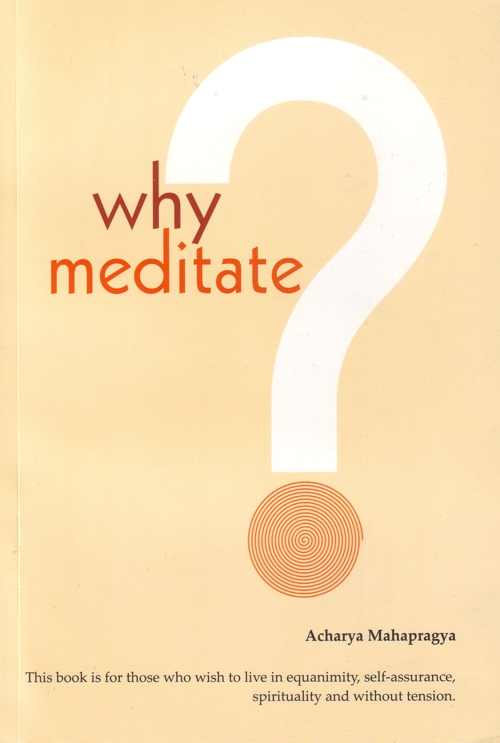

There was once a poor man. He used to earn his living by working for those whom he met on his way. He would set out early in the morning, run errands for people, and return home with his earnings. One day, he went in front of a house whose owner asked him to get 5 kg of wheat. So he took the required bag, and went on. He proceeded further and another person asked him to get vegetables. Again, he took the required bag, and went on. On going further, someone asked him to drop his daughter to her in-laws' house. So he went on to drop her in another village. Both the persons who had asked him to get vegetables and wheat were waiting for him. “When will he come?” they wondered. He had gone on to another village. Why did he not succeed in completing his work? This is because of lack of concentration on one task. If he had focused on one task, he would have succeeded.
Acharya Tulsi took a resolution in a village of Maharashtra called Manchar. Acharya Tulsi read a magazine Dharmadut. He read that the compilation and editing of Tripitak was going on. A question arose in his mind, despite so much work already completed in Buddha's scriptures, new work is still taking place, but nobody is working on our Agams the Holy Scriptures. Acharya Tulsi asked me to work on Agams and I gave my consent. Today it is almost 50 years, but still the work is being done consistently. This work is going on, even if we are on a journey and we halt at a place. During this period, many Agams have been compiled and translated and the work is still taking place continuously. For success and efficiency, we need to concentrate on every little detail. Without that, nothing is possible.
Today, there is discussion worldwide on the development of working efficiency. Very good principles have been put forward and we must consider them also. The principles obtained from the practice of Preksha Meditation are also very important and useful. Without these, other things are also not achievable. We must develop them and also reap the worldly benefits of Preksha Meditation.
Another essential principle of working efficiency is to make plans. Whatever work we want to do, we must plan beforehand. Unplanned work is not perfect. We celebrated Yogakshem Varsh under the leadership and guidance of Acharya Tulsi for a period of one year. About 400 monks and nuns, samans & samanis were trained in the field of Agam, Preksha Meditation, etc. The result of this training is that every monk and nun, wherever they have gone for conducting programs, have been asked, “Where do you get training?” The training was only for one year, but it took a whole year of planning to make it so effective.
Acharya Tulsi was in Taranagar, a town of Churu district. It was the time of night and all were asleep. A thought came in Acharya Tulsi's mind, “Till now, plans have not been made. How will we work on such a big project?” Muni Balchandji came to me and woke me up. I woke up suddenly and my first question was, “Is Acharya Shri feeling well?” He replied, “Acharya Shri is fine, and he is calling you.” Acharya Shri told me, “You are sleeping without any worries but I am not getting sleep. It's a big project and we haven't planned for it, how will it be successful?” Then I said, “I will make plans very soon. Don't worry about it.” It took one year to make the plans. We prepared the calendar for that entire year. From this incident, we can see that we cannot be successful or efficient without planning.
The second essential principle of working efficiency is unity. Unity is required for completion of any work. Unity speeds up the work. A single person cannot accomplish a big task. Therefore, unity is very important. United people execute the work quickly.
The third essential principle of operational efficiency is teamwork. Without mutual support, work cannot be completed successfully. A person cannot be efficient on his own unless he gets the support of others. Without assistance and support, teamwork cannot be achieved. To ask for help is a significant principle of efficiency.
On one occasion, Lord Indra had invited the gods and demons. The motive behind this was to make a compromise between them so that they cease to fight every now and then. The demons accused Lord Indra of being biased towards the gods. This is not fair, they said. He should be neutral. Indra tried very hard to appease them, but they would not understand. So he made a plan and called them for lunch. There was a condition that whosoever comes for lunch, will have their hands tied up. This was done, and their hands were tied up with a wooden support in such a way that no one could not take a morsel on his own. Demons came first for lunch. They sat in a row. The time given to have food was half an hour. The time ran out but they could not eat. They stood up hungry. Now it was the turn of the gods. They also sat in a row. Even their hands were tied up. They sat for 2-3 minutes and thought of ways to overcome this problem. Brihaspati, who is the master of the gods, said to them, “Don't sit like this. Take a morsel. If your hand doesn't reach your mouth, take it to the person who is sitting in front of you.” They took a morsel and started feeding each other. They ate their lunch with relish. Indra asked the demons, “Did you finish your lunch?” They replied angrily, “How could we? Your arrangement was so bad.” Indra asked the gods, “Did you finish your lunch?” They replied, “Yes, we finished.” They explained the way they had taken their food. Indra said, “Where am I partial? One who supports the other becomes a god and those who don't lend mutual support become demons. What can I do?”
An efficient person is one who knows how to support others.
The above principles demand deep thinking in the context of operational efficiency. Practicing Preksha Meditation can develop certain qualities. If those qualities are not developed, by frequent practice of meditation, then the practice is worthless. This development should take place within us. By the development of these qualities, a person becomes efficient on his own. He can execute his work in a better way and live his life peacefully. With the practice of Preksha Meditation, evaluate whether or not these qualities are being inculcated within you. If the process of evaluation and practice of meditation go simultaneously, then extra effort just for the development of operational efficiency is not necessary.
 Acharya Mahaprajna
Acharya Mahaprajna
 Copyright by Acharya Mahaprajna ©2005
Copyright by Acharya Mahaprajna ©2005